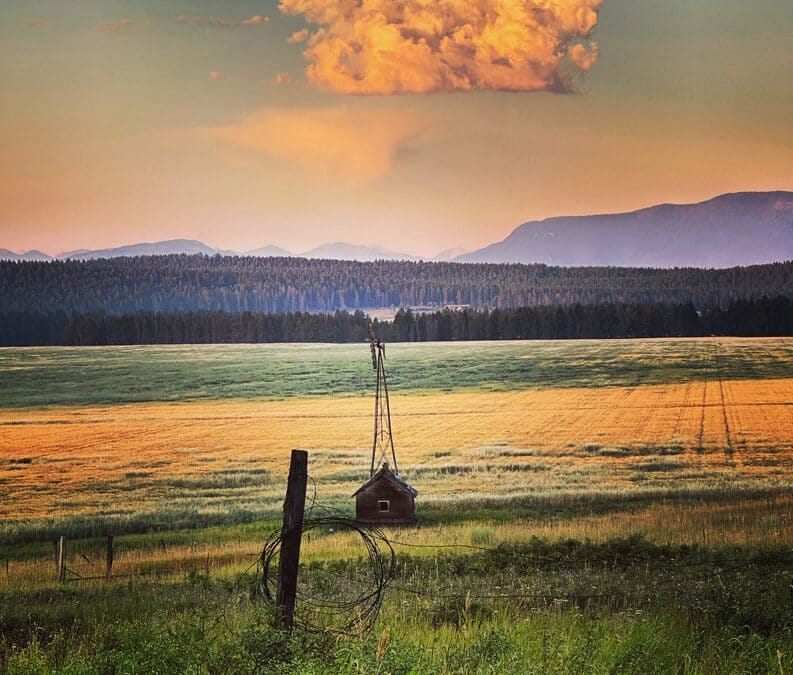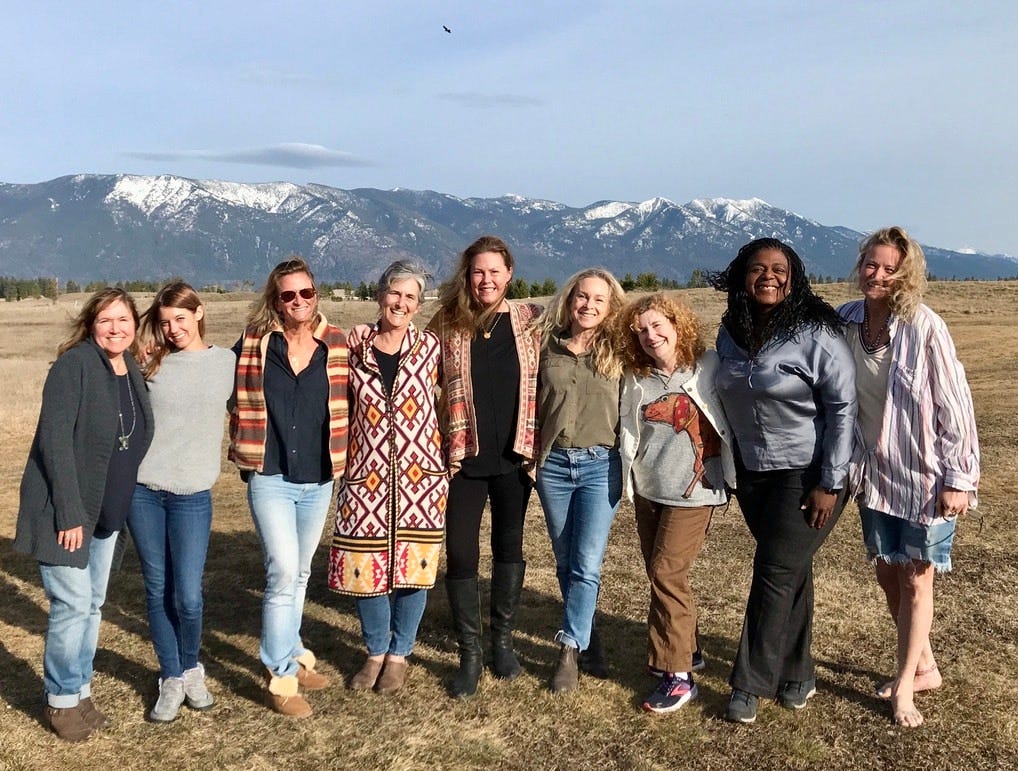Room
how one word can turn the scared into the sacred
***Still a few rare spots left on my Haven Wander Uruguay retreat this January. For more info go here.
As seen on Maria Shriver’s Sunday Paper
Montanans like to say, “You won’t know that a mountain lion’s stalking you until you feel its teeth on the back of your neck.”
For years, I felt that stalking— those teeth. The thing is: I rarely felt that way in the woods. Instead, I felt that way in the grocery store, in my office, doing the laundry, lying in bed at 4 a.m. with my eyes wide open. When the stress of life spiked, I could feel this way for weeks at a time. And I knew that it had to stop.
If you are someone who works very hard, whether in a profession or passion or role of any sort, it’s likely that you know what I mean. And it’s likely that you are keeping it all inside. Smiles on the outside buying broccoli, but duking it out in your mind all-the-while. And on top of that: you know better. That’s the worst part: knowing better.
For years, each morning before I got out of bed— before the fangs threatened to set in my neck— I tried to create a calm and steady clean slate for the day. I had (and still have) different methods: prayer, meditation, breathing, reading poems, writing in my journal. These modalities would start to catch, and I’d feel that liminal lifting into a free, calm place that I hoped I could sustain all day. I figured the more I practiced, the more I’d be free of those seemingly ever-present fangs, and live in serenity and balance. It felt like a matter of life or death.
But all too often, sometimes before I’d even finished brushing my teeth, my ears would be ringing, my brain buzzing, my stomach churning. I’d catch myself holding my breath. My shoulders up in my jawline. My teeth clenched. And again, what made it even worse: I knew better. This quieting of the mind and body seemed insurmountable, no matter how hard I tried. And moreover, I couldn’t keep lying to myself about how severely this pressure (that I put on myself, by the way), ran my life.
There’s nothing like a warning from a dear and dying friend who, two weeks before she died, told me: “You feed that mangy wolf. You don’t have to. I know you and you’ll still create what you need to create. But you can do it differently.”
Her memorial service is what began my quest to find that “differently.” There was a lot of talk about the mangy wolf (which is what she called her cancer). And me with my stalking mangy mountain lion. I walked out into the world after that gathering, and with tears in my eyes, I said, “I will not feed you. Not for one more second. I am not going to compartmentalize my freedom any longer.”
So, I started asking the wise, passionate (and yes, busy) women in my life how they managed their wise, passionate, busy lives…
I realized that I’d been spending too much time talking with the ones who were running from the fangs, like me. Instead, I chose the ones with the true smiles buying broccoli— the ones who say they’re fine and mean it.
I started with a friend who is one of the best balancers of stress I know, as well as the busiest. I ranted: “I love my job. I love teaching and leading writing retreats. I love everything about helping people find their voice and their flow and their ease, using the written word. But every single day I look at my Google calendar and I feel like I need to fasten my seatbelt. There’s too much on it and I’m letting it run my life.”
She paused, giving me time to digest my words. “You can change that if you really want to. The question is: do you really want to? Or is being crazy-busy part of your identity? Have you normalized this behavior because it somehow serves you? That’s the question.”
The heavens opened. “It is not serving me.”
It all started unraveling then, as epiphanies tend to do.
What if I stopped running in this race against myself? Would the sky fall? Likely not. I’d likely still get to my destination, just not out of breath, on fumes, in adrenal blowout, feeling like I’m about to be attacked.
Then my friend said, “I’ve heard you speak about your relationship with your muse. That your writing is your free zone and the way you breathe. Once you’re in the act, there’s no inner critic. The stress is gone. And you’re like a child at play in the field of wonder.”
“That’s the truth,” I replied. “The inner critic— she’s the greatest stress spinner of all. But not while I’m writing. I don’t let her anywhere near that. Same with the retreats and all the teaching I do. Sacrosanct, wonderous, ground.”
My friend’s eyes widened and her smile spread. “So why not treat your whole life the same way? Why not just put down that sword you’re carrying around in all your roles. You’ve proven yourself. You can let yourself breathe now. You can work just as hard, and get just as much out of it, but with self-kindness. Curiosity. Wonder. Calm. Balance. Even freedom.”
Sounded possible. But honestly…improbable. Then I remembered that years ago, when I started leading writing retreats, I asked a wise, veteran, retreat leader friend for some advice. I knew I would be fine in the usual departments: leadership, inspiration, craft-instruction, editing, positive energy, and group dynamics. My concern stemmed from a fear that I wouldn’t know how to keep myself from taking on each individual’s emotions and problems. People who want to write are usually working through high-stakes emotions and high-stakes problems.
She said, “Give half of what you want to give, and it will be more than enough.” It took me a while before I really put her wisdom to work. Once I did, it was metamorphic.
So I made a date with her. “I know how to have good boundaries at my retreats. But not in my relationship with the stressors in my life.”
“Try this.” She put her palms out flat, one to the sky, and the other to the ground, and she stretched her arms as far as they would go in each direction. Then she did the same thing to both sides of herself.
“Ah,” I said. “Protection.”
She smiled. “It’s more than that. Protection implies that there’s something to protect yourself from. Think of it like you’re creating space for yourself that’s only yours. Claimed space. At work. At play. Everywhere you go.”
Huh. Space for myself.
I tried her technique but couldn’t quite fully pull it off. The mangy mountain lion still found a way to break through.
I am a word wanderer. Maybe it was a word that I needed, as the anonymous 14th century Christian mystic prescribed in The Cloud of Unknowing.
“Take a little word of just one syllable to help you focus your attention. The shorter the word the better…Choose a word like ‘God’ or ‘love’ or any other word of one syllable that appeals to you and impress it indelibly on your heart so that it is always there…”
I’d read that book decades ago, written about it, used it as a practice, and lost it along the way. One word. One word that would become a hymn that I could never not hear. A word that played itself inside me, ringing through the rafters of my ribs and sending sound ripples throughout my whole body and whole being.
I thought of my friend’s space-creating practice, and I brought in the word space. Space around me. Space that no one could infiltrate. Space that was pressure-less. Stressless.
Each morning I spent time before I opened my eyes, repeating the word space in my mind, and imagining this free space around me. Not my physical being. My unseen one. My soul. It worked, sort of. But space is such a, well, spacious, massive, unending creature. So, I welcomed other words…and then one day, my Word came to me: room.
Room felt better. A place I could occupy. Room in the way of space, but also a room around me that was all mine. No one was allowed in— like my childhood treehouse. I realized that this is exactly how I feel about my writing, my retreats, and everything I teach…where no mangy mountain lion dares to enter.
Virginia Woolf’s “A Room of One’s Own” made new and utter sense to me. A room can be a physical place, and I believe that everyone needs a sacred, impenetrable space for themselves, no matter what they do. Even if it’s very small. But suddenly I looked at a room as an inner holding— one that I could fill with the essence of myself.
Because the essence of myself is not running scared, waiting for life to pounce. The essence of myself is in co-creation with something hungry for something entirely pure, joyful, and free. I think of that Word— room— and say it in my mind, and I am instantly centered in this calm, gentle, playful, wonderous, safe inner-worldly (and inner-wordly) place. May you find your Word, too.
To book an introductory call, talk about your writing dreams, and how Haven could be a match for you, email me!
You do not have to be a writer to receive all that Haven is. Just a seeker. A word-wanderer. Come finally find your voice, set your writing on fire, and get the teaching, mentorship, and community you deserve! All in the glory of The Dancing Spirit Ranch in stunning Flathead Valley, Montana.
Still room on my October retreats…
October 23-27
October 30-November 3






This is so relatable. You put words to my inner strife. I, too, try to rewrite my waking and realize all is well. I love your word “room” and am glad you found what you need.
What a beautiful, deeply honest, powerful piece, Laura. This feels so real and relatable (and I know not just to me because this is a similar conversation I have with nearly all of my women clients who are 40+!). Thank you for sharing so wholeheartedly. To let us see you in this way deepens my respect for you and trust in you. I appreciate you, friend.